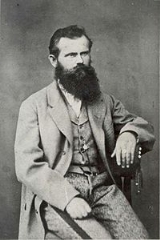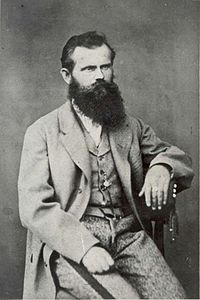
Simon Jenko
Encyclopedia

Slovenian language
Slovene or Slovenian is a South Slavic language spoken by approximately 2.5 million speakers worldwide, the majority of whom live in Slovenia. It is the first language of about 1.85 million people and is one of the 23 official and working languages of the European Union...
poet
Poet
A poet is a person who writes poetry. A poet's work can be literal, meaning that his work is derived from a specific event, or metaphorical, meaning that his work can take on many meanings and forms. Poets have existed since antiquity, in nearly all languages, and have produced works that vary...
, lyricist
Lyricist
A lyricist is a songwriter who specializes in lyrics. A singer who writes the lyrics to songs is a singer-lyricist. This differentiates from a singer-composer, who composes the song's melody.-Collaboration:...
and writer
Writer
A writer is a person who produces literature, such as novels, short stories, plays, screenplays, poetry, or other literary art. Skilled writers are able to use language to portray ideas and images....
.
Jenko was born in Podreča
Podreca
Podreča is a village on the right bank of the Sava River in the municipality of Kranj in the Upper Carniola region of Slovenia.It is the birthplace of the Slovene poet and writer Simon Jenko....
in the Sora Plain (Sorško polje) in Upper Carniola
Upper Carniola
Upper Carniola is a traditional region of Slovenia, the northern mountainous part of the larger Carniola region. The centre of the region is Kranj, while other urban centers include Jesenice, Tržič, Škofja Loka, Kamnik, and Domžale.- Historical background :...
, then part of the Austrian Empire
Austrian Empire
The Austrian Empire was a modern era successor empire, which was centered on what is today's Austria and which officially lasted from 1804 to 1867. It was followed by the Empire of Austria-Hungary, whose proclamation was a diplomatic move that elevated Hungary's status within the Austrian Empire...
, now in Slovenia
Slovenia
Slovenia , officially the Republic of Slovenia , is a country in Central and Southeastern Europe touching the Alps and bordering the Mediterranean. Slovenia borders Italy to the west, Croatia to the south and east, Hungary to the northeast, and Austria to the north, and also has a small portion of...
, as an illegitimate son of poor peasant parents. Later he moved with his parents to Praše
Praše
Praše is a village on the right bank of the Sava River in the municipality of Kranj in the Upper Carniola region of Slovenia. It was first mentioned in a land terrier from 1291.The Slovene poet and writer Simon Jenko, born at nearby Podreča, lived in Praše....
, which was the very inspiration for most of his poets and short stories. The local clergy enabled him to study in Novo Mesto
Novo Mesto
Novo Mesto is a city and municipality in southeastern Slovenia, close to the border with Croatia. The town is traditionally considered the economic and cultural centre of the historic Lower Carniola region.-Geography:...
, Klagenfurt
Klagenfurt
-Name:Carinthia's eminent linguists Primus Lessiak and Eberhard Kranzmayer assumed that the city's name, which literally translates as "ford of lament" or "ford of complaints", had something to do with the superstitious thought that fateful fairies or demons tend to live around treacherous waters...
, and Ljubljana
Ljubljana
Ljubljana is the capital of Slovenia and its largest city. It is the centre of the City Municipality of Ljubljana. It is located in the centre of the country in the Ljubljana Basin, and is a mid-sized city of some 270,000 inhabitants...
. Contrary to their will, however, Jenko decided not to become a priest, but enrolled at the University of Vienna
University of Vienna
The University of Vienna is a public university located in Vienna, Austria. It was founded by Duke Rudolph IV in 1365 and is the oldest university in the German-speaking world...
, where he studied law
Law
Law is a system of rules and guidelines which are enforced through social institutions to govern behavior, wherever possible. It shapes politics, economics and society in numerous ways and serves as a social mediator of relations between people. Contract law regulates everything from buying a bus...
, classical philology
Classical philology
Classical philology is the study of ancient Greek and classical Latin. Classical philology has been defined as "the careful study of the literary and philosophical texts of the ancient Greek and Roman worlds." Greek and Latin literature and civilization have traditionally been considered...
, and history
History
History is the discovery, collection, organization, and presentation of information about past events. History can also mean the period of time after writing was invented. Scholars who write about history are called historians...
.
Together with Fran Levstik
Fran Levstik
Fran Levstik was a Slovene writer, political activist, playwright and critic. he was one of the most prominent exponents of the Young Slovene political movement.-Life and work:...
, Josip Jurčič
Josip Jurcic
Josip Jurčič was a Slovene writer and journalist. He was born in Muljava, Austrian Empire and died in Ljubljana, Austria-Hungary...
, Josip Stritar
Josip Stritar
Josip Stritar was a Slovene writer, poet, playwright, publisher and translator.Stritar spent his early childhood in his home village in rural Lower Carniola and was sent to school in Ljubljana...
, Simon Gregorčič
Simon Gregorcic
Simon Gregorčič was a Slovene poet and Roman Catholic priest.- Biography :Gregorčič was born in the small mountain village of Vrsno above the river Soča in the County of Gorizia and Gradisca. In 1851, he attended primary school in Libušnje, but was in 1855 sent to school in Gorizia. After...
, and Fran Erjavec, he belonged to the group of prominent Slovenes that embraced a progressive
Progressivism
Progressivism is an umbrella term for a political ideology advocating or favoring social, political, and economic reform or changes. Progressivism is often viewed by some conservatives, constitutionalists, and libertarians to be in opposition to conservative or reactionary ideologies.The...
and nationalist political ideology (often with Pan-Slavic elements) and introduced literary realism
Literary realism
Literary realism most often refers to the trend, beginning with certain works of nineteenth-century French literature and extending to late-nineteenth- and early-twentieth-century authors in various countries, towards depictions of contemporary life and society "as they were." In the spirit of...
in Slovenian literature
Slovenian literature
Slovene literature, meaning the literature in the Slovene language, starts with Freising manuscripts around 1000. From first printed Slovene religious books in 1550 it is followed by these literary periods and notable authors:-Middle Ages:-Folk poetry:...
. He mostly wrote lyrical and patriotic poems, which reveal an influenced of late romanticism
Romanticism
Romanticism was an artistic, literary and intellectual movement that originated in the second half of the 18th century in Europe, and gained strength in reaction to the Industrial Revolution...
. He also wrote short prose
Prose
Prose is the most typical form of written language, applying ordinary grammatical structure and natural flow of speech rather than rhythmic structure...
in a realistic style.
He was the cousin of the composer Davorin Jenko
Davorin Jenko
thumb|right|Davorin JenkoDavorin Jenko was a Slovene composer. He is sometimes considered as the father of Slovenian national Romantic music...
. The two composed the song Naprej zastava slave
Naprej zastava slave
"Naprej zastava slave" is a Slovene poem that was used as the Slovenian national anthem between 1918 and 1990.It was written by Simon Jenko and set to music by Davorin Jenko on 16 May 1860....
together, which used to be the unofficial Slovenia
Slovenia
Slovenia , officially the Republic of Slovenia , is a country in Central and Southeastern Europe touching the Alps and bordering the Mediterranean. Slovenia borders Italy to the west, Croatia to the south and east, Hungary to the northeast, and Austria to the north, and also has a small portion of...
n national anthem
National anthem
A national anthem is a generally patriotic musical composition that evokes and eulogizes the history, traditions and struggles of its people, recognized either by a nation's government as the official national song, or by convention through use by the people.- History :Anthems rose to prominence...
up to the 1980s.
He died in Kranj
Kranj
' is the third largest municipality and fourth largest city in Slovenia, with a population of 54,500 . It is located approximately 20 km north-west of Ljubljana...
.
The Jenko Award
Jenko Award
The Jenko Award is a literary award in Slovenia awarded each year for the best poetry collection in Slovene published in the previous two years. It has been bestowed since 1986 by the Slovene Writers' Association....
bestowed each year for the best poetry collection in Slovene published in the previous two years by the Slovene Writers' Association
Slovene Writers' Association
The Slovene Writers' Association is a non-profit association of Slovene writers based in Ljubljana.The Association was founded on 21 April 1872 in Ljubljana at the initiative of Davorin Trstenjak who also became its first president. It operated under various names over the years and re-adopted its...
is named after Simon Jenko.
See also
- List of Slovenian language poets
- Slovenian literatureSlovenian literatureSlovene literature, meaning the literature in the Slovene language, starts with Freising manuscripts around 1000. From first printed Slovene religious books in 1550 it is followed by these literary periods and notable authors:-Middle Ages:-Folk poetry:...
- Culture of SloveniaCulture of SloveniaSlovenia's first book was printed by the Protestant reformer Primož Trubar . It was actually two books, Katekizem and Abecednik, which was published in 1550 in Tübingen, Germany....
- Romantic nationalismRomantic nationalismRomantic nationalism is the form of nationalism in which the state derives its political legitimacy as an organic consequence of the unity of those it governs...

